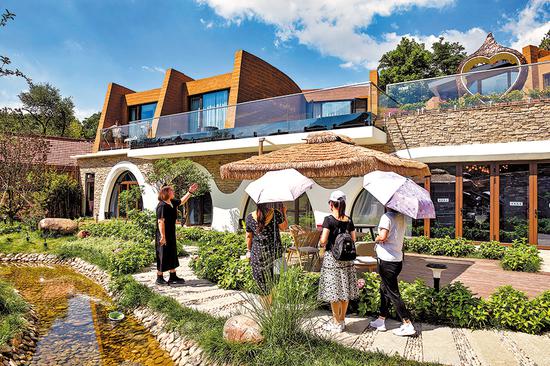
B&Bs in Xijingyu Village, Jizhou District, Tianjin, are attracting tourists. (Photo courtesy of China Daily)
The 21st Huangya Pass Great Wall Marathon kicked off in Jizhou District, a mountainous area of Tianjin, on May 18, attracting 3,000 runners from about 20 countries.
The event brought significant business to the area, especially for those providing accommodation.
“Some of the participants have been taking part in the contest for more than 10 years and have already booked numerous bed and breakfasts to enjoy the district’s mountain scenery,” a district spokesman said.
Statistics show that over 300 boutique homestays have been established in the area since industrial production halted in 2018. Apart from these luxury homes, agritainment projects such as vegetable cultivation and cultural dining activities have been started by 2,089 households.
Both the agritainment project and the boutique homestays have created a total of 60,000 employment opportunities for local farmers.
Last year, total revenue generated by homestay and agritainment projects reached 590 million yuan ($81.5 million), marking an 81 percent increase year-on-year.
“The region’s tourism sector is thriving across 20 townships and 100 villages, and we have devised specific development strategies to strengthen our brand and culture, and enhance guests’ boutique homestay experience,” said Song Weilong, party secretary of Jizhou municipality and director of the city’s culture and tourism bureau.
Gao Cuilian, a 61-year-old entrepreneur from Changzhou village, was the first person to open a B&B in the Jizhou area.
“I am continually updating and enhancing our offerings to customize our services,” she said.
As tourists’ demand for stylish accommodation continues to grow, Gao runs a mid- to high-end homestay with 60 rooms that can accommodate up to 100 guests per day.
When she bravely set up her first homestay in 1994, few believed that the concept of “experiencing farm life and enjoying light, non-greasy meals” could be profitable.
She recalled that at the time, she had renovated her mountainside home near the Jiushanding Scenic Area, also known as the “Peaks of Nine Mountains,” the highest peak in Tianjin, and would prepare fish and duck dishes caught in the mountain rivers for her guests.
These days, she said, many villagers no longer personally manage their B&Bs.
“Several companies have chosen to rent out homestays to city-based managers for several years to ensure a stable income,” she explained.
According to the data, 31 out of 35 villages in Xiaying Township operate B&Bs.
Reservations for homestays in traditional architecture villages such as Guojiagou and Xijingyu usually need to be made at least one month in advance.
“Bed and breakfasts have now emerged as a new economic driver for the region, and the growing trend of hybrid businesses – bookstores, cafes and history- or music-themed bed and breakfasts – signals a new wave of merging culture and tourism,” said Li Pengyue, party chairman of Xiaying.



